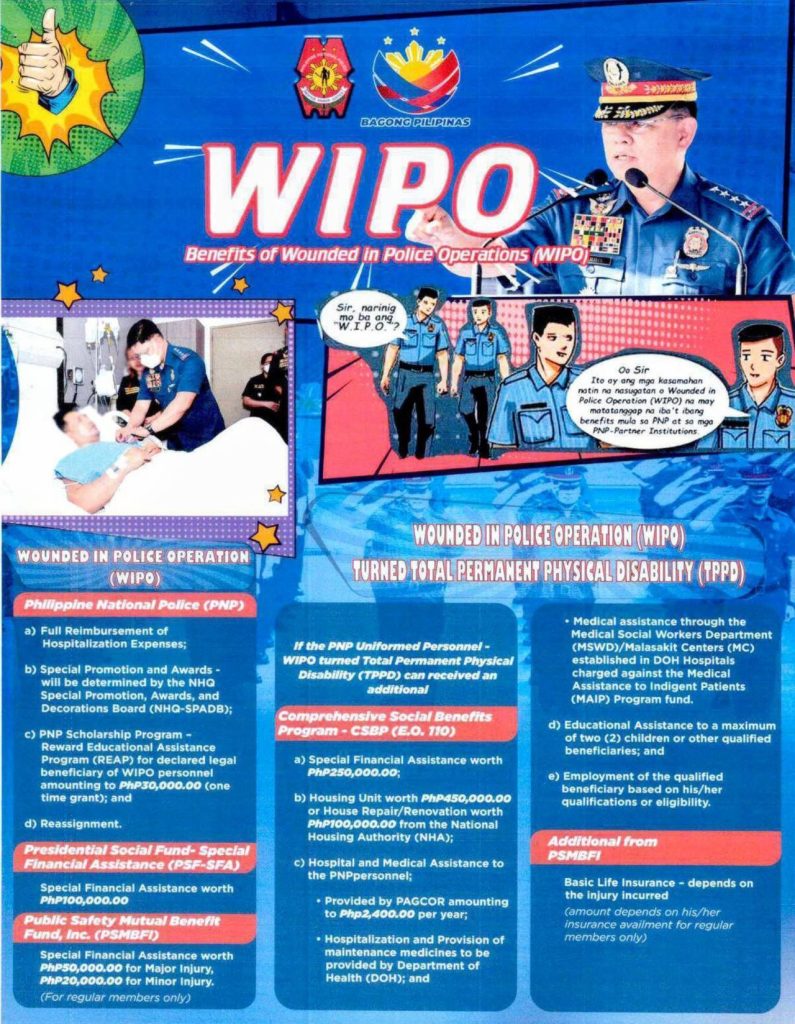Medical treatment and hospitalization can weigh heavily on the police officer and their dependents, so the Philippine National Police (PNP) provides financial and medical assistance through the Wounded in Police Operation (WIPO) Hospitalization Assistance Program. This initiative provides full payment of hospitalization expenses funded through the PNP Provident Fund WIPO Medical Loan and covers hospitalization expenses incurred by active PNP personnel who were injured during legitimate police operations. With this financial aid program, medical costs are covered for officers injured while working and their families are protected from the burden of hospital bills.
This guide explains everything you need to know about getting this assistance—from understanding what the program is, to its purpose and goals, who can benefit from it, and how to apply for assistance.
Program Features

Instead of leaving injured officers and their families to shoulder medical bills, the WIPO Hospitalization expenses assistance program directly pays hospitals through the PNP Provident Fund WIPO Medical Loan.
Some of its most notable features include:
- Interest-free medical loan directly paid from the PNP Provident Fund.
- Payment based on the final hospital bill (minus PhilHealth and HMO coverage).
- Coverage of professional fees and official receipts for medical supplies used during confinement.
Purpose
The program’s primary purpose is to support the welfare and morale of police officers wounded in operations. By covering hospitalization costs, the PNP helps officers focus on their recovery without burdening their dependents with heavy financial obligations.
This assistance is also a way of recognizing the sacrifices of police personnel who risk their lives to enforce the law and protect the public.
Goals
Its main goals include:
- Provision of timely medical and financial aid to injured officers.
- Full settlement of hospitalization expenses through the PNP Provident Fund.
- Reduction of the financial burden on PNP dependents.
- Strengthened institutional support for active police personnel wounded in duty.
Benefits for PNP Dependents and Families
By shouldering hospitalization costs, the program provides significant relief to PNP dependents. Families no longer need to worry about out-of-pocket medical expenses during confinement.
Additionally, dependents may still access other government assistance programs such as:
- Educational support (DepEd, CHED, TESDA).
- Livelihood programs (DTI, DOLE, DSWD).
- Housing assistance (NHA).
This holistic support system strengthens the safety net for PNP personnel and their families.
Who Can Avail of This Assistance?
The program is available to:
- Active PNP personnel wounded or injured while engaged in legitimate police operations.
- Dependents of the injured officer may coordinate with the designated Wounded Assistance Officer (WAO) for processing.
Requirements
To file for hospitalization expenses assistance, the following documents must be prepared:
- Certification of Line of Duty (CLO) issued by the Chief of Office/Unit Commander.
- Letter of Guaranty issued by the C, RCD, or BFO.
- Final hospital bill (net of PhilHealth/HMO).
- Official receipts/sales invoices for medical supplies used.
- Professional fee receipts.
- All required documents for RHE claims to be submitted within 90 days after discharge.
Step-by-Step Procedures
If a PNP personnel is wounded in police operations, here are the steps for claiming hospitalization assistance:
Step 1. Verification of Incident
- The office/unit confirms that the injury was sustained in a legitimate police operation.
Step 2. Issuance of Certification of Line of Duty (CLO)
- The Chief of Office/Unit Commander issues a CLO to certify the legitimacy of the injury.
Step 3. Letter of Guaranty to Hospital
- The C, RCD, or BFO issues a Letter of Guaranty addressed to the hospital to assure payment of medical bills.
Step 4. Application for Medical Loan
- Before discharge, the WIPO, assisted by the Wounded Assistance Officer (WAO), applies for a PNP Provident Fund WIPO Medical Loan.
Step 5. Settlement of Hospital Bills
- Upon discharge, the office/unit ensures the full settlement of expenses through the Provident Fund medical loan.
Step 6. Submission of RHE Claims
- Within 90 days after discharge, the WIPO, assisted by the WAO, must submit all required documents for RHE claims under PNP MC 2021-040.
Where to File and Get Assistance
Applications and processing for WIPO hospitalization expenses are handled by the office/unit of assignment of the wounded police personnel.
The designated WAO will guide the officer or their dependents in:
- Preparing documents.
- Filing the WIPO Medical Loan.
- Submitting RHE claims.
For official guidelines and downloadable forms, claimants should coordinate with their respective unit or consult the PNP Provident Fund Office.
Other Guidelines for Hospitalization Expenses Assistance
Do take note that the program follows specific procedures which are all clearly outlined in Memorandum Circular No. 2024-086. The MC also clearly states that:
- Payment will be made through the PNP Provident Fund WIPO Medical Loan.
- Loan coverage is based on:
- Final hospital bill (net of PhilHealth/HMO benefits).
- Professional fees.
- Official receipts or sales invoices for medical supplies used.
- Each police office/unit must designate a Wounded Assistance Officer (WAO) to help the injured personnel from hospital admission up to the filing of reimbursement claims.
- The Chief of Office/Unit Commander, Regional Comptroller Division (RCD), or Budget and Finance Officer (BFO) must issue a Letter of Guaranty to the hospital where the officer is confined.
- Hospitalization expenses will later be settled through the Reimbursement of Hospitalization Expenses (RHE) claims.
Funding Source
The program is funded through the PNP Provident Fund WIPO Medical Loan, which is designed exclusively to cover hospitalization expenses of personnel wounded in operations.
This assistance is separate from other benefits under the Comprehensive Social Benefits Program (CSBP), which may include:
- PhilHealth premium payments.
- DOH medical assistance and provision of maintenance medicines.
- Livelihood, employment, and financial literacy training programs from agencies such as DOLE, DTI, TESDA, and DSWD.
PNP personnel and dependents may avail of these programs alongside WIPO hospitalization assistance, depending on eligibility.
Important Reminders
For your reference, here are a few more things worth taking note of:
- Hospitalization expenses will be settled only for injuries sustained in legitimate police operations.
- Claims must be filed within 90 days after hospital discharge.
- Assistance is interest-free but will be based on the final hospital bill minus PhilHealth/HMO coverage.
- For additional benefits, claimants may also explore programs under the Comprehensive Social Benefits Program (CSBP).
Need More Help?
For more information and updates, interested personnel are advised to check official PNP issuances and coordinate with their respective units.
